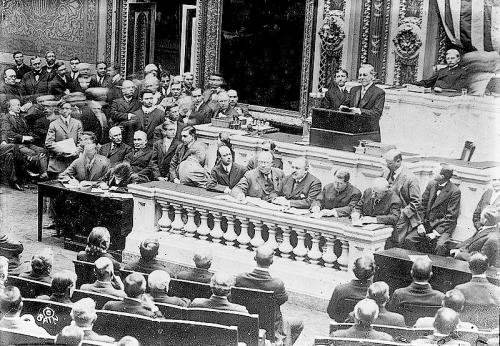Democracy was not, however, totally safe back on the homefront.
然而在后方,民主的安全并没有完全得到保证
Americans of German descent were harassed, German language and culture became object of hatred,
有着德国血统的美国人受到骚扰,德语和德国文化都成为仇恨对象
sauerkraut was renamed liberty cabbage and Spitz dogs became known as Eskimo Terriers.
德国泡菜被改叫自由菜,德国绒毛犬被正名为美国爱斯基摩犬
On another level, the Wilson administration lashed out against the center, both directly and through right-wing front organizations.
另一方面,威尔逊政权也开始直接地或者通过右翼前线组织打击国内反战势力
In 1918 the Sedition Act was passed by Congress and signed by Wilson,
1918年,国会通过反煽动法并由威尔逊签署
making it illegal to "use disloyal profane scurrilous or abusive language about the US government, US flag or US armed forces".
该法案规定,使用不忠,亵渎,下流或辱骂的语言谈论美国政府,美国旗帜或者美国军队将属非法行为

Many patriotic Americans whose only crime was disagreement with Woodrow's policies found themselves imprisoned or even deported.
许多爱国的美国人只不过是不同意伍德罗的政策,就因此遭到了囚禁、甚至是驱逐出境
One sublime irony is that while Woodrow Wilson's America deported people to Soviet Union for communist sympathies,
极其讽刺的是当伍德罗·威尔逊将美国支持共产主义的人驱逐到苏联的时候
Vladimir Lenin's Russia was deporting people westward for Western sympathies.
弗拉基米尔·列宁也在将俄国支持西方的人驱逐到西方
To president Wilson, a democratic world had no place for empires.
对于威尔逊总统来说,一个民主的世界是不允许帝国存在的
On January 8th 1918, he delivered his famous 14 point speech to a joint session of Congress.
1918年1月8日,他向国会联席会议发表了着名的十四点和平原则讲话



